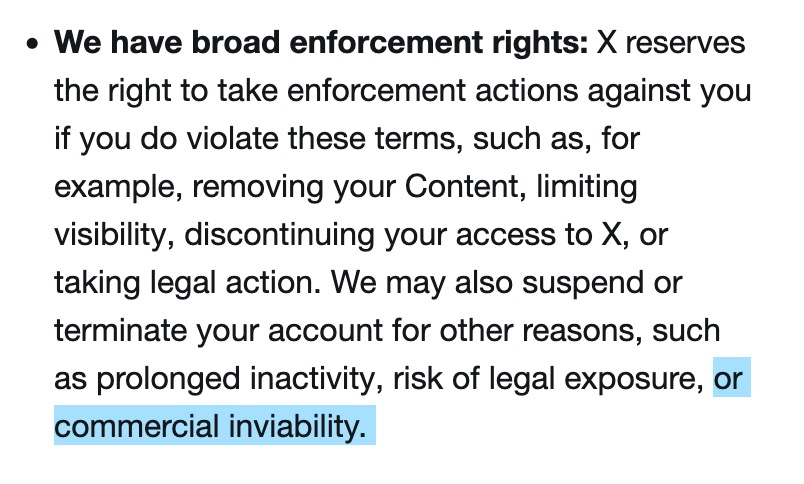In a move that will likely draw scrutiny, the social media platform formerly known as Twitter, now rebranded as X under the ownership of Elon Musk, is set to implement a new policy on September 29th of this year. While the transition from Twitter to X was met with widespread speculation, the content of the forthcoming policy has become a focal point of discussion due to its retention of a contentious clause about “commercial viability.”
Related: Freedom of Speech Requires Freedom of Reach
The original Twitter policy, which granted the platform the authority to ban users based on their perceived “commercial viability,” had sparked concerns about potential censorship and bias aligned with corporate interests. Critics argued that this clause could be leveraged to stifle diverse opinions and suppress content that did not align with the platform’s economic agenda.
Despite the change in ownership and the rebranding effort, it is notable that the new policy for X retains a strikingly similar clause. The published policy states, “We have broad enforcement rights: X reserves the right to take enforcement actions against you if you do violate these terms, such as, for example, removing your Content, limiting visibility, discontinuing your access to X, or taking legal action. We may also suspend or terminate your account for other reasons, such as prolonged inactivity, risk of legal exposure, or commercial inviability.”

The decision to maintain the “commercial inviability” wording will likely ignite a fresh wave of concerns among users and advocacy groups alike. While proponents argue that such clauses are essential for maintaining the platform’s financial stability and preventing misuse, skeptics worry that they could still be exploited to stifle dissenting voices and suppress content that challenges prevailing narratives.
Elon Musk’s ownership of X brought about a period of speculation regarding the platform’s direction under his leadership. The decision to retain the “commercial inviability” clause adds a layer of complexity to this discussion, as it appears to maintain a continuity with the controversial policy of its predecessor.
As the implementation date of the new policy approaches, conversations surrounding freedom of expression, corporate influence, and digital censorship are likely to gain momentum. The extent to which X’s enforcement of the “commercial inviability” clause will mirror its predecessor remains to be seen, but it is evident that the platform’s approach to content moderation will continue to be a topic of scrutiny.
In an era where social media platforms play a significant role in shaping public discourse, the policies enacted by these platforms carry substantial implications for societal dialogue and democratic engagement. The debate surrounding X’s “commercial inviability” clause underscores the intricate balance between maintaining a viable online ecosystem and upholding the principles of free expression and diverse discourse.
It remains to be seen how X, under Elon Musk’s stewardship, will navigate the complexities of content moderation, corporate interests, and user expectations, as it moves forward with the implementation of its new policy in September.










